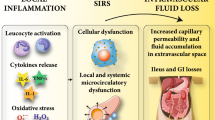Summary
The therapeutic effects of intensive insulin therapy in treatment of traumatic shock combined with multiple organ dysfunction syndrome (MODS) were investigated. A total of 114 patients with traumatic shock combined with MODS were randomly divided into two groups: control group (n=56) treated with conventional therapy, and intensive insulin therapy group (n=58) treated with conventional therapy plus continuous insulin pumping to control the blood glucose level at range of 4.4–6.1 mmol/L. White blood cells (WBC) counts, prothrombin time (PT), serum creatinine (SCr), alanine aminotransferase (ALT), serum albumin and PaO2 were measured before and at the day 1, 3, 5, 7 and 14 after treatment. The incidence of gastrointestinal dysfunction, the incidence of MODS, hospital stay and the mortality were also observed and compared. After intensive insulin therapy, the WBC counts, SCr, ALT and PT were significantly reduced (P<0.05), but the level of serum albumin was significantly increased (P<0.05) at the day 3, 5, 7 and 14. In the meantime, the PaO2 was significantly elevated at the day 3, 5 and 7 (P<0.01) after intensive insulin therapy. The incidence of gastrointestinal dysfunction, the incidence of MODS, the length of hospital stay and the mortality were markedly decreased (P<0.01). The results suggest early treatment with intensive insulin therapy is effective for traumatic shock combined with MODS and can decrease the length of hospital stay and the mortality.
Similar content being viewed by others
References
Davies MG, Hagen PO. Systemic inflammatory response syndrome. Br J Surg, 1997,84(7):920–935
McCowen KC, Malhotra A, Bistrian BR. Stress-induced hyperglycemia. Crit Care Clin, 2001,17(1):107–124
Van Den Berghe G, Wouters P, Weekers F, et al. Intensive insulin therapy in critically ill patients. N Eng1 J Med, 2001,345(19):1359–1367
Hardaway RM. Traumatic shock alias posttrauma critical illness. Am Surg, 2000,66(3):284–290
Marshall JC, Cook DJ, Christon NV, et al. Multiple organ dysfunction score: a reliable descriptor of complex clinical outcome. Crit Care Med, 1995,2(10):1638–1652
Goris RJ, te Boekhorst TP, Nuytinck JK, et al. Multiple organ failure: generalize autodestructive inflammation? Arch Surg, 1985,120(10):1109–1115
Fu WJ, Teng QS, Li TS, et al. Fluid resuscitation in traumatic shock. Zhong Guo Wei Zhong Bing Ji Jiu Yi Xue (Chinese), 2003,15(12):739–741
Lin E, Calavo SE, Lowry SE. Inflammatory cytokines and cell response in surgery. Surgery, 2000,127(2): 117–126
Rassias AJ, Marrin CA, Arruda J, et al. Insulin infusion improves neutrophil function in diabetic cardiac surgery patients. Aensth Analg, 1999,88(5):1011–1016
Avignon A, Monnier L. Insulin sensitivity and stress. Diabetes Metab, 2001,27(2 Pt 2):233–238
Esposito K, Nappo F, Marfell R, et al. Inflammatory cytokines and cell response in surgery concentrations are acutely increased by hyperglycemia in human role of oxidative stress. Circulation, 2002,106(16):2067–2072
Mesotten D, Swinnen JV, Vanderhoydonc F, et al. Contribution of circulating lipids to the improved outcome of critical illness by glycemic control with intensive insulin therapy. J Clin Endocrinol Metab, 2004,89(1):219–226
Satomi N, Sakurai A, Haranaka K, et al. Relationship of hypoglycemia to tumor necrosis factor production and antitumor activity: role of glucose, insulin, and macrophages. J Natl Cancer Inst, 1985,74(6):1255
Das UN. Is insulin an anti inflammation molecule. Nutrition, 2001,17(5):409
Sanchez-Zamora Y, Terrazas LI, Vilches-Flores A, et al. Macrophage migration inhibitory factor is a therapeutic target in treatment of non-insulin-dependent diabetes mellitus. FASEB J, 2010,24(7):2583–2590
Vincent JL, Navickis RJ, Wilkes MM. Morbidity in hospitalized patients receiving human albumin: A meta-analysis of randomized, controlled trials. Crit Care Med, 2004,32(10):2029–2038
Norman J. The role of cytokine in the pathogensis of acute pancreatitis. Am J Surg, 1998,175(2):76
Baue AE. Predicting outcome in injured patients and its relationship to circulating cytokines. Shock, 1995,4(1): 39–40
Das UN. Is insulin an endogenous cardio protector. Crit Care, 2002,6(5):389–393
Beger HG, Rau BM. Severe pancreatitis: clinical course and management. World J Gastroenterol, 2007,13(39): 5043
Treggiari MM, Karir V, Yanez ND, et al. Intensive insulin therapy and mortality in critically ill patients. Crit Care Med, 2008,12(1):R29
Author information
Authors and Affiliations
Corresponding author
Additional information
Both authors contributed equally to this work.
This project was supported by a grant from National Natural Sciences Foundation of China (No. 30870951).
Rights and permissions
About this article
Cite this article
Du, J., Liu, H., Liu, R. et al. Clinical effects of intensive insulin therapy treating traumatic shock combined with multiple organ dysfunction syndrome. J. Huazhong Univ. Sci. Technol. [Med. Sci.] 31, 194–198 (2011). https://doi.org/10.1007/s11596-011-0251-4
Received:
Published:
Issue Date:
DOI: https://doi.org/10.1007/s11596-011-0251-4




